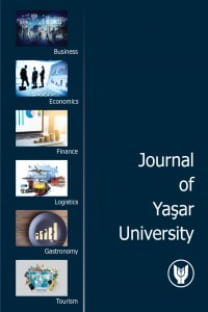Toplumsal Sorumluluk Öğretimi ve İngilizce Ders Kitapları: Etnisite, Cinsiyet ve Engellilik
Bu çalışmanın amacı İngilizce ders kitaplarında yer alan okuma pasajları ve görsel araçların etnisite, cinsiyet ve engellilik bağlamında bir incelemesini ortaya çıkarmaktır. Cunningsworth (1995) tarafından daha önce önerilmiş bulunan bir çetele bu çalışmanın veri toplama kısmında kullanılmıştır. Çetelede milliyetler, engelliliğin bulunma ya da bulunmama durumu, engellilik türü, erkek ve kadınların sayıları ve onlara atfedilen meslek ve roller yer almaktadır. Toplam 240 okuma pasajı incelenmiş ve frekanslar ile yüzdelikler yoluyla sonuçlar ortaya konulmuştur. Çalışmanın sonuçlarına göre etnisite, cinsiyet ve engellilik ders kitaplarında hassasiyet gösterilen gerçeklerden değildir. Sonuçlara göre ders kitaplarında engellilik hemen hiç yer almazken kadınların rakamsal oranı erkeklerden daha azdır. Etnisite bağlamında ise anadili İngilizce olan bireyler olmayanlara göre daha çok ilgi görmektedir.
Anahtar Kelimeler:
Engellilik, Etnisite, Cinsiyet, Milliyet, Ders Kitabı
Socially Responsible Teaching and English Language Coursebooks: Focus on Ethnicity, Sex and Disability
The purpose of this study is to analyze the reading passages and related pictures published in English language coursebooks in terms of ethnicity, sex and disability by relating them to socially responsible teaching. A checklist formerly used by Cunningsworth (1995) was adapted and used for the purposes of this study. This checklist included the headings of nationalities, whether any kind of disability is included or not, types of disability, number of males and females and gender specific roles attached to males and females. A total of 240 reading passages were analyzed throughout the study and frequencies and percentages for each coursebook were calculated. Results indicate that the coursebooks analyzed generally lack sensitivity to differences based on nationalities, sexes and disability. Results also demonstrate that disability gets little or no place in the coursebooks studied. Also, it was found that females are not represented equally with males. With regards to ethnicity, native speakers of English appear in the coursebooks more than non-native speakers do
Keywords:
Disability, Ethnicity, Sex, Nationality, Coursebook,
___
- Anderson, Gregory G. 1996. “Global issues in the university ESL classroom.” The Language Teacher Online, no page.
- Arikan, Arda. 2005. “Age, gender and social class in ELT coursebooks: A critical study.” Hacettepe University Journal of Education. 28: 29-39.
- Brown, H. Douglas. 1990. “On track to century 21.” Plenary talk at the 24th annual convention of TESOL (Teachers of English to Speakers of Other Languages), San Francisco, USA.
- Browne, Ken. 1998. An introduction to sociology. Cambridge: Polity Press.
- Cates, Kip. 2000. “Entry for 'global education'”, In Byram, M. (Ed.), Routledge Encyclopedia of Language Teaching and Learning. London: Routledge, 241-243.
- Cunningsworth, Alan. 1995. Choosing your coursebook. Oxford: Heinemann.
- Dyer, Brenda & Bushell, Brenda. 1996. “World issues or a global perspective?” The Language Teacher, 20(11): 10-16.
- Freire, Paulo. 1994. Pedagogy of hope: Reliving pedagogy of the oppressed. New York: Continuum.
- Freire, Paulo. 1998. Teachers as cultural workers. Colorado: Westview Press.
- Ghaith, Ghazi & Shaaban, Kassim. 1994. “Peace education in the ESL classroom.” TESL Reporter, 27(2): 55-62.
- Giroux, Henry. 1985. “Teachers as transformative intellectuals.” Social Education, 49(5): 376–379.
- Helvacıoğlu, Firdevs. 1996. Ders kitaplarında cinsiyetçilik 1928-1995. Kaynak Yayınları.
- Kazak, Meliha. 2002. “Görme engellilere yönelik kütüphanecilik hizmetlerinde Türkiye’deki son gelişmeler: Gazi Üniversitesi Merkez Kütüphanesi görme engelliler bölümü örneği.” Türk Kütüphaneciliği , 22(2): 216-221.
- Maley, Alan. 1992. “Global issues in ELT.” Practical English Teaching, 13(2): 73.
- McInerney, Peter. 2004. “Mapping the literature: Social justice and education.” Retrieved August 20, 2004, from www.ehlt.flinders.edu.au/education/sjrc/docs/Mapping_the_literature1.doc
- Nieto, Sonia. 2000. “Placing equity front and centre: Some thoughts on transforming teacher education for a new century.” Journal of Teacher Education, 51(3): 180-187.
- Sendika.org. 2014, February 15. 5. Demokratik Eğitim Kurultayı: ‘Özgürleşme yolunda’. Accessed August ozgurlesme-yolunda/
- http://www.sendika.org/2014/02/5-demokratik-egitim-kurultayi
- Yakovchuk, Nadezhda. 2004. “Global issues and global values in foreign language education.” Accessed August 8, 2004, http://www.elted.net/issues/volume-8/yako-volume8.pdf
- ISSN: 1305-970X
- Başlangıç: 2006
- Yayıncı: Yaşar Üniversitesi
Sayıdaki Diğer Makaleler
Rizwan DANISH, Ahmad SHAHID, Asad HUMAYON, Muhammad NAWAZ
2014 HONG KONG SANAT MÜZESİ SERGİSİ ÖRNEĞİ ÜZERİNDEN HEYKELTIRAŞ JU MING’IN SANAT HAYATI VE ESERLERİ
İzmir İlindeki Belediyelerin Sosyal Sorumluluk Çalışmaları ile İlgili Nitel Bir Araştırma
Emel YARIMOGLU, Fatma HACIOGLU, Selin GENCTURK, Yasemin KAMALI, Can SAYGINER
TURİZM POTANSİYELİ OLAN BÖLGELERDE TOPLUMSAL KAPASİTE ALGISI: ADIYAMAN ÖRNEĞİ
İbrahim YILMAZ, Caner CALISKAN
DESTİNASYON MARKA İMAJI VE BİR PAZAR BÖLÜMÜ OLARAK İŞ AMAÇLI GELEN TURİSTLERE YÖNELİK UYGULANMASI
Çalışanların Kurumsal Sosyal Sorumluluğa Bakışları: İzmir İlinde Bir Odak Grup Çalışması
Toplumsal Sorumluluk Öğretimi ve İngilizce Ders Kitapları: Etnisite, Cinsiyet ve Engellilik
